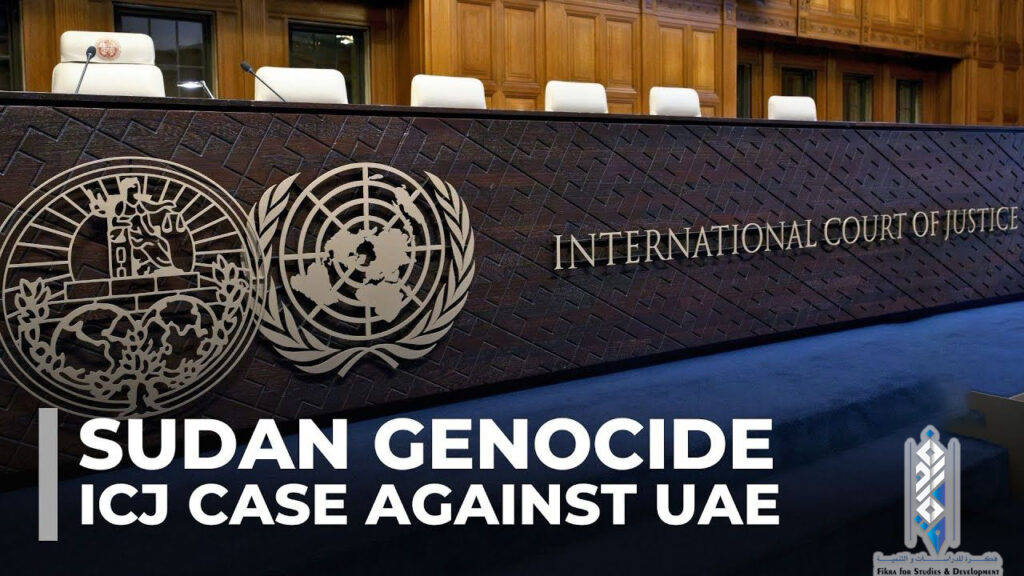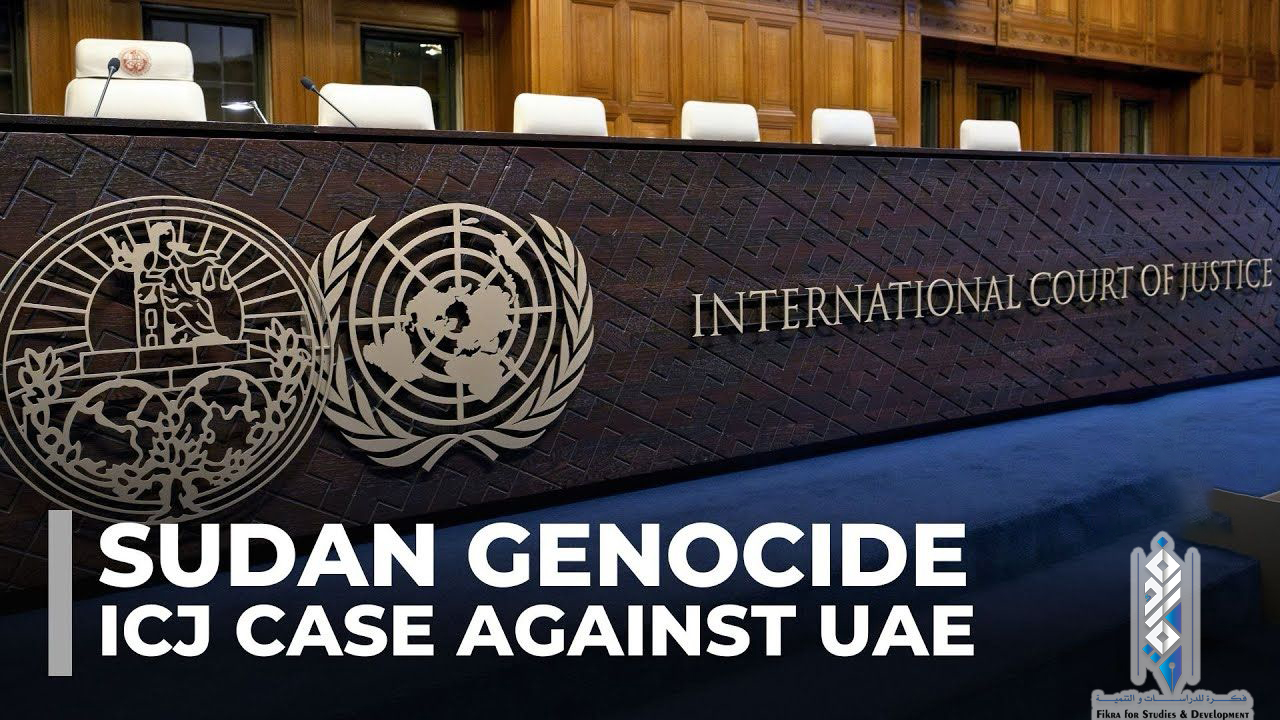Fikra for Studies and Development In an Open Letter to the ICJ: International Legal Scholars Challenge the Legitimacy of States’ Reservations on Genocide Trials Amid Sudan-UAE Case
Fikra for Studies and Development In an Open Letter to the ICJ: International Legal Scholars Challenge the Legitimacy of States’ Reservations on Genocide Trials Amid Sudan-UAE Case

International experts sign an open letter to the International Court of Justice presenting an independent legal opinion calling for the invalidation of reservations to Article IX of the Genocide Convention, amid ongoing violations in Darfur and the Court’s consideration of the Sudan v. UAE case.
Geneva/Cairo – April 30, 2025
In a significant legal development, a group of prominent international jurists—including former judges and prosecutors of international tribunals and representatives of leading human rights institutions—have issued an open letter to the International Court of Justice (ICJ), containing an independent legal opinion affirming the invalidity of sweeping reservations to Article IX of the Convention on the Prevention and Punishment of the Crime of Genocide (commonly referred to as the Genocide Convention). Article IX is considered a cornerstone in enabling the ICJ to adjudicate disputes relating to the interpretation and application of the Convention.
Article IX constitutes a crucial legal tool for holding states accountable for acts of genocide, granting the ICJ jurisdiction over such matters. According to the signatories, blanket reservations to this article strip the Convention of its substance and undermine its effectiveness in preventing and punishing genocide—particularly in the absence of any alternative oversight mechanism within the treaty framework.
Sudan at the Heart of the Matter
This legal opinion comes at a time when international attention is focused on Sudan, where the Rapid Support Forces (RSF) continue to perpetrate atrocities and violations that, according to independent reports, UN findings, and statements by the U.S. Government, amount to acts of genocide. These crimes have been carried out with sustained support and arms supplies from the United Arab Emirates, prompting the Government of Sudan to initiate legal proceedings against the UAE at the ICJ, accusing it of breaching its obligations under the Genocide Convention by aiding and abetting genocide through its proxy, the RSF.
The legal opinion cited in the open letter highlights the international community’s failure to prevent genocide in Darfur over the past two decades and the continued pattern of impunity to this day.
Among the most notable signatories of the open letter to the ICJ—which is expected to issue its preliminary decision on the Sudan v. UAE case on Monday, May 5, 2025—are Justice Richard J. Goldstone, former chief prosecutor of the International Criminal Tribunals for the former Yugoslavia and Rwanda and the first-ever chief prosecutor of an international criminal court. Goldstone played a pivotal role in establishing the modern legal infrastructure for international justice concerning war crimes, crimes against humanity, and genocide. Also signing the letter is David M. Crane, founding chief prosecutor of the Special Court for Sierra Leone, who issued the first indictment against a sitting head of state—President Charles Taylor of Liberia—setting a global precedent for holding heads of state accountable for international crimes. Irwin Cotler, Chair of the Raoul Wallenberg Centre for Human Rights and former Minister of Justice and Attorney General of Canada. Hans Corell, former UN Under-Secretary-General for Legal Affairs and Legal Counsel of the United Nations. Gerald Gahima, former Prosecutor General of Rwanda in the post-genocide period (1999–2003). Frédéric Mégret, Professor of International Law at McGill University, Canada. Dr. Melanie O’Brien, Professor of International Law at the University of Western Australia and President of the International Association of Genocide Scholars. Kristin Rosella, Co-Executive Director of LexCollective. Yonah Diamond, Legal Counsel at the Raoul Wallenberg Centre for Human Rights and Mutasim Ali, the prominent Sudanese legal scholar and researcher.
The signatories argue that, under the spirit and object of international law, reservations to Article IX deprive victims—such as those who have suffered in Sudan—of access to international justice. The ICJ remains the sole judicial body capable of holding states accountable under the Genocide Convention.
Sudan v. UAE: A Turning Point for International Justice
The case filed by the Republic of Sudan against the United Arab Emirates at the ICJ marks a critical juncture for the future of international justice. The importance of the independent legal opinion is heightened by the Court’s imminent decision—expected next Monday—which accuses Abu Dhabi of violating its international obligations by supporting the RSF, a militia accused of committing atrocities amounting to genocide, particularly in the Darfur region.
The UAE has lodged ambiguous reservations regarding the ICJ’s jurisdiction to adjudicate matters under the Genocide Convention and appears to be leveraging these reservations to obstruct justice and evade accountability.
The forthcoming ruling is expected to set a legal precedent that could redefine state responsibility for the actions of allies or proxies in internal conflicts with international implications. It will also test the international community’s—especially the ICJ’s—commitment to upholding the Genocide Convention beyond political pressure or procedural technicalities.
The legal opinion underscores that only 16 out of 153 states parties to the Convention maintain comprehensive reservations to Article IX—an increasingly declining trend. This supports the jurists’ call to deem such reservations invalid and incompatible with the Convention’s core purpose: to liberate humanity from the scourge of genocide.
In light of escalating crises in regions such as Sudan, Gaza, and beyond, the signatories warned that leaving Article IX subject to reservations will only perpetuate impunity and enable perpetrators to hide behind sovereign immunities—an outcome previously described by former ICJ judge Abdou Koroma as procedural injustice.
In a significant legal development, a group of prominent international jurists—including former judges and prosecutors of international tribunals and representatives of leading human rights institutions—have issued an open letter to the International Court of Justice (ICJ), containing an independent legal opinion affirming the invalidity of sweeping reservations to Article IX of the Convention on the Prevention and Punishment of the Crime of Genocide (commonly referred to as the Genocide Convention). Article IX is considered a cornerstone in enabling the ICJ to adjudicate disputes relating to the interpretation and application of the Convention.
Article IX constitutes a crucial legal tool for holding states accountable for acts of genocide, granting the ICJ jurisdiction over such matters. According to the signatories, blanket reservations to this article strip the Convention of its substance and undermine its effectiveness in preventing and punishing genocide—particularly in the absence of any alternative oversight mechanism within the treaty framework.
Sudan at the Heart of the Matter
This legal opinion comes at a time when international attention is focused on Sudan, where the Rapid Support Forces (RSF) continue to perpetrate atrocities and violations that, according to independent reports, UN findings, and statements by the U.S. Government, amount to acts of genocide. These crimes have been carried out with sustained support and arms supplies from the United Arab Emirates, prompting the Government of Sudan to initiate legal proceedings against the UAE at the ICJ, accusing it of breaching its obligations under the Genocide Convention by aiding and abetting genocide through its proxy, the RSF.
The legal opinion cited in the open letter highlights the international community’s failure to prevent genocide in Darfur over the past two decades and the continued pattern of impunity to this day.
Among the most notable signatories of the open letter to the ICJ—which is expected to issue its preliminary decision on the Sudan v. UAE case on Monday, May 5, 2025—are Justice Richard J. Goldstone, former chief prosecutor of the International Criminal Tribunals for the former Yugoslavia and Rwanda and the first-ever chief prosecutor of an international criminal court. Goldstone played a pivotal role in establishing the modern legal infrastructure for international justice concerning war crimes, crimes against humanity, and genocide. Also signing the letter is David M. Crane, founding chief prosecutor of the Special Court for Sierra Leone, who issued the first indictment against a sitting head of state—President Charles Taylor of Liberia—setting a global precedent for holding heads of state accountable for international crimes. Irwin Cotler, Chair of the Raoul Wallenberg Centre for Human Rights and former Minister of Justice and Attorney General of Canada. Hans Corell, former UN Under-Secretary-General for Legal Affairs and Legal Counsel of the United Nations. Gerald Gahima, former Prosecutor General of Rwanda in the post-genocide period (1999–2003). Frédéric Mégret, Professor of International Law at McGill University, Canada. Dr. Melanie O’Brien, Professor of International Law at the University of Western Australia and President of the International Association of Genocide Scholars. Kristin Rosella, Co-Executive Director of LexCollective. Yonah Diamond, Legal Counsel at the Raoul Wallenberg Centre for Human Rights and Mutasim Ali, the prominent Sudanese legal scholar and researcher.
The signatories argue that, under the spirit and object of international law, reservations to Article IX deprive victims—such as those who have suffered in Sudan—of access to international justice. The ICJ remains the sole judicial body capable of holding states accountable under the Genocide Convention.
Sudan v. UAE: A Turning Point for International Justice
The case filed by the Republic of Sudan against the United Arab Emirates at the ICJ marks a critical juncture for the future of international justice. The importance of the independent legal opinion is heightened by the Court’s imminent decision—expected next Monday—which accuses Abu Dhabi of violating its international obligations by supporting the RSF, a militia accused of committing atrocities amounting to genocide, particularly in the Darfur region.
The UAE has lodged ambiguous reservations regarding the ICJ’s jurisdiction to adjudicate matters under the Genocide Convention and appears to be leveraging these reservations to obstruct justice and evade accountability.
The forthcoming ruling is expected to set a legal precedent that could redefine state responsibility for the actions of allies or proxies in internal conflicts with international implications. It will also test the international community’s—especially the ICJ’s—commitment to upholding the Genocide Convention beyond political pressure or procedural technicalities.
The legal opinion underscores that only 16 out of 153 states parties to the Convention maintain comprehensive reservations to Article IX—an increasingly declining trend. This supports the jurists’ call to deem such reservations invalid and incompatible with the Convention’s core purpose: to liberate humanity from the scourge of genocide.
In light of escalating crises in regions such as Sudan, Gaza, and beyond, the signatories warned that leaving Article IX subject to reservations will only perpetuate impunity and enable perpetrators to hide behind sovereign immunities—an outcome previously described by former ICJ judge Abdou Koroma as procedural injustice.


